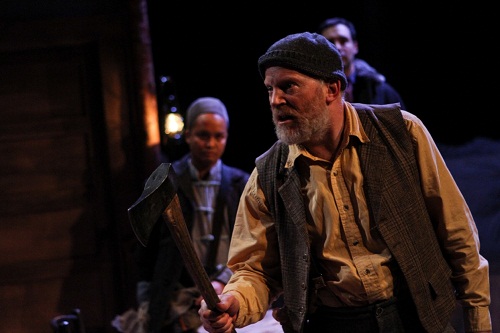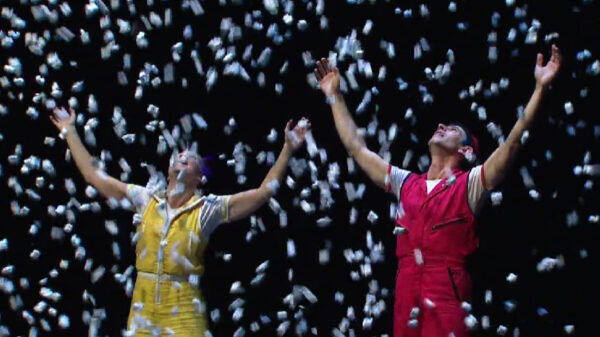Review: The Bells by Theresa Rebeck. Produced by Strawberry Theatre Workshop. Directed by Julie Beckman. With Jose Abaoag, Patrick Allcorn, Peter Crook, Brenda Joyner, Galen Joseph Osier, John Q. Smith and Lisa Viertel. Now through February 18, 2012 at the Erickson Theatre Off Broadway.

Things get "axe-y"...Jose Abaoag as Lin Xuifei and Peter Crook as Mathias, (in rear, Patrick Allcorn as Baptiste) in "The Bells" Strawberry Theatre Workshop. Photo by John Ullman
Hallelujah! Let’s sing some praises of joy and redemption because Mr. Strangeways’ long theatrical drought is over! I’ve had to suffer through several theater productions I wasn’t overly fond of and was starting to get that hopeless feeling of desperation that I would never see anything of interest or artistic importance on a Seattle stage. Praise the Powers That Be the recent back to back shows have given me new hope for the future of Seattle Theater!
What’s even more exciting, is that “The Bells”, Strawberry Theatre Workshop’s current production of the play by Theresa Rebeck, has broken their string of banality! I’ve long been a huge fan of the “Strawshop” but 2011 was, in my opinion, an off year for the company; I wasn’t a fan of their productions of “Cloud 9” or “Inherit the Wind”. Unlike those two shows, “The Bells” is a fascinating, edgy and timely production about greed and the American desire to achieve “Manifest Destiny” at any cost, and it features a strong script by Ms Rebeck, and well crafted and taut direction from Julie Beckman. It also helps that it has a powerful cast giving exceptional performances, and headed by Peter Crook, Jose Abaoag, Brenda Joyner and John Q. Smith. It’s a winning night of thoughtful, grown up theater that’s not for the feint of heart…”The Bells” is a chilling look into a murderous heart of darkness and all the souls it claims.
“The Bells’ is not a “new” story, though. Theresa Rebeck has freely adapted a 19th Century melodrama, also called “The Bells” about the moral and ethical complications faced by a man who has committed a murder in his past for the sake of his family and community…or, so he likes to claim. While the original work was set in Europe, Ms Rebeck has transferred the plot and characters to Alaska, twenty years after the original Yukon Gold Rush that sent thousands of people northward in search of gold, glory and fortune. While a few managed to make that fortune, thousands more barely eked out a living, and many died in the harsh conditions of the near arctic frontier.
More after the Jump
But, where there is gold, there will be greed, and not a few men and women were murdered in the pursuit of financial security. One man, a Chinese immigrant named Lin Xuifei, hits a vein rich enough to net him $3000 which is enough to get him back home to China. Meanwhile, the mining camp closest to Xuifei’s claim is hit hard by disease and the threat of famine, and that $3000 could buy food to save the community; one man decides that the fate of his family and community is more important than the fate of “The Chinaman” and the outsider is savagely murdered. The town survives and some members prosper while others fail, but more than one member of the community knows the secret and the arrival of a handsome French Canadian asking a lot of questions leads to the possibility that the scandal will be revealed. Meanwhile, the ghostly presence of Xuifei on the fringes of the camp, could drive the murderer mad with desperation and fear during the long, dark winter nights in the Yukon.
“The Bells” is a psychological thriller that manages to be thrilling despite the fact it’s pretty obvious from early in the play, the identity of the murderer; “The Bells” isn’t meant to be a “whodunit.” Instead, Ms Rebeck focuses on the self-destruction of a man plagued by the guilt of the crime he’s committed and the effect that crime has on his family and community. And, it all comes together under the eternally dark and frigid skyline of the Alaskan frontier…the setting of “The Bells” is vitally important to the theme and tone of the play. Man’s own greed is influenced by the harsh realities of his natural environment.
Julie Beckman’s direction carefully juxtaposes the characters against the backdrop of this harsh reality and her even handling of the material and the performances keeps the melodrama from teetering over into the overwrought world of hillbilly “mellerdrammer” with evil villains twirling their not so metaphorical moustaches as they tie the fair maiden to the train tracks. It’s a big story with magical elements, but the direction keeps it rooted in reality and possibility and it always crackles with dramatic tension.
The performances are very strong with exceptional work from everyone in the cast. As the three down on their luck camp bums, Galen Joseph Osier, Lisa Viertel and especially John Q. Smith almost steal the show with performances that aren’t afraid to be big and larger than life when it’s called for, but also chillingly and poignantly real when it’s required from the text. The roles could easily fall into “Yosemite Sam” territory, but the actors avoid that pitfall and make us believe in the desperation and the bravado of their lives.
Both Brenda Joyner, as the daughter Annette, and Patrick Allcorn as the mysterious French-Canadian, excel as our token love interests with Ms Joyner particularly effective as she deals with revelations that could shatter the only world she has ever known. Mr. Allcorn is appropriately virile as the traditional heroic man of mystery who has his own internal demons to cope with, and ably handles an accent that in lesser hands, could be cartoonish and comical. And, they make a cute couple.
But, this play really centers on Matthias and Xuifei and both Peter Crook and Jose Abaoag do excellent work here, carefully underplaying roles that could be over the top in lesser hands. Killers and ghosts can quickly become fodder for “Scooby Doo” styles of acting, but the two men give gentle but steely performances that strengthen the tension and connection between the two characters. The work is appropriately haunting yet visceral and commanding.
There is fine work from Anastasia Armes on the costumes and Reed Nakayama for the moody and effective lighting but the big design standout is the brilliant and incessant script of sound created by Evan Mosher. The never ending howling wind of the wilderness frontier is almost always present in the background, varying in strength and intensity, to the point where the layers of sound present become a vital and functioning character in the play. It’s a brilliant example of how a sound design can be a vital component of a unified artistic production and Mr. Mosher should be praised for it.
I do have a couple of criticisms for this play and this production. Theresa Rebeck has crafted a strong and dramatic play, but personally it does get a little repetitive towards the end, with the themes of greed and environment hammered home more times than absolutely necessary…it’s not that difficult of a concept to understand. The Matthias character has a long and dramatic monologue that frequently flashes with brilliance, but also ends up repeating itself towards the end…it could use a wee bit of cutting.
And, I sympathize with Montana Tippett and the set demands for this play which require an interior general store set, and the vast expanse of the Alaskan wilderness. Ms Tippett’s interior set was fine, though I had issues with some of the decor, but the draped white sheeting over platforms used for the exteriors wasn’t very convincing or dramatic. Outdoor sets and especially snow covered ones, are very difficult to design and execute especially on a limited budget, and as I stated, Ms Tippett and Strawshop have all my sympathies for those challenges, but I have to be honest and say I wasn’t much impressed with what they ultimately achieved. If white sheeting is to be the answer, then it needed to be more artfully draped and formed…otherwise, it ends up looking like you’re just closing up the summer house for the season. (But, I did love the background with the mountain range, artfully lighted by Mr. Nakayama.)
Who’s this for? Fans of dark, psychological theater beautifully crafted, directed and acted. Ghost story fans. Anyone who adores colorful bearded prospectors telling ribald stories. Anyone who enjoys reading Conrad’s “Heart of Darkness” or watching von Stoheim’s “Greed” or “Apocalypse Now”. Adults who like theater that has a brain…and an icy heart.

















